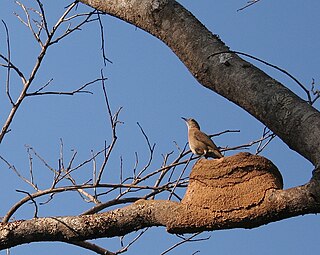
The hornero birds are members of the genus Furnarius in the family Furnariidae, native to South America. The English common name appears in many books as "ovenbird".

The rufous hornero is a medium-sized ovenbird in the family Furnariidae. It occurs in eastern South America and is the national bird of Argentina. Also known as the red ovenbird, it is common in savannas, second-growth scrub, pastures, and agricultural land and is synanthropic. Its range includes midwestern, southeastern, and southern Brazil, Bolivia, Paraguay, Uruguay, and northern and central Argentina, extending as far south as northern Patagonia. The species is most closely related to the crested hornero of Paraguay and Argentina. There are four accepted subspecies.

The cobalt-rumped parrotlet or blue-winged parrotlet is a species of parrot in the family Psittacidae.

The West Peruvian screech owl or Peruvian screech owl is a species of owl in the family Strigidae. It is found in Ecuador and Peru.

The pale batis, also known as the Mozambique batis or East coast batis is a species of small bird in the wattle-eyes family, Platysteiridae. It occurs in eastern Africa, mostly in lowland miombo woodland.
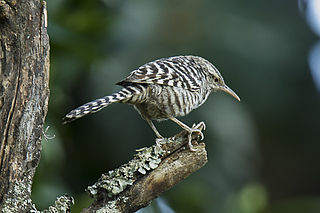
The fasciated wren is a species of bird in the family Troglodytidae. It is found in Ecuador and Peru.

The red-and-white spinetail is a species of bird in the Furnariinae subfamily of the ovenbird family Furnariidae. It is found in Brazil, Colombia, and Peru.
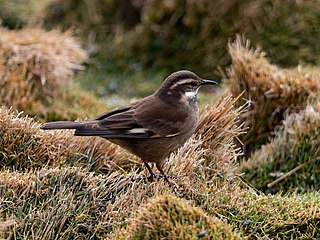
Olrog's cinclodes is a species of bird in the Furnariinae subfamily of the ovenbird family Furnariidae. It is endemic to Argentina.

The line-cheeked spinetail is an arboreal species of bird in the ovenbird family Furnariidae. It is a common species in the Andes in Ecuador and Peru. Its natural habitat is subtropical or tropical moist montane forests, woodland and scrub. It is distinguished from other species by its distribution, behaviour and white supercilium. There are two recognized subspecies, which are in reality a gradient in morphology and plumage from one extreme to the other.
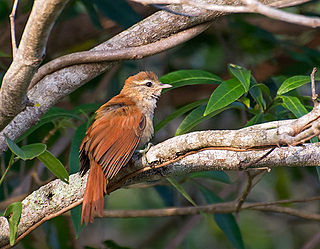
The rusty-backed spinetail is a Neotropical species of bird in the Furnariinae subfamily of the ovenbird family Furnariidae. It is found in Bolivia, Brazil, Colombia, Paraguay, Peru, Venezuela, and possibly Guyana.

The crested hornero is a species of bird in the Furnariinae subfamily of the ovenbird family Furnariidae. It is found in Argentina, Bolivia, and Paraguay.

The band-tailed hornero, also known as wing-banded hornero, is a species of bird in the Furnariinae subfamily of the ovenbird family Furnariidae. It is endemic to Brazil.
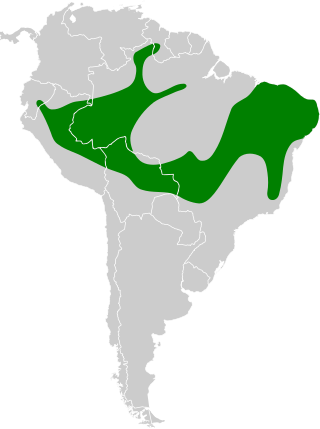
The pale-legged hornero is a species of bird in the Furnariinae subfamily of the ovenbird family Furnariidae. It is found in Bolivia, Brazil, Guyana, and Peru.

The bay hornero or pale-billed hornero is a species of bird in the Furnariinae subfamily of the ovenbird family Furnariidae. It is found in Brazil, Colombia, Peru, and possibly Eucador.

The long-billed woodcreeper is a sub-oscine passerine bird in subfamily Dendrocolaptinae of the ovenbird family Furnariidae. It is found in Bolivia, Brazil, Colombia, Ecuador, French Guiana, Peru, and Venezuela.

The great spinetail is a Near Threatened species of bird in the Furnariinae subfamily of the ovenbird family Furnariidae. It is endemic to Peru.

The dark-breasted spinetail is a species of bird in the Furnariinae subfamily of the ovenbird family Furnariidae. It is found in Bolivia, Brazil, Colombia, Ecuador, and Peru.

The Chaco earthcreeper is a species of bird in the Furnariinae subfamily of the ovenbird family Furnariidae. It is found in Argentina, Bolivia, and Paraguay, and as a vagrant in Brazil.

The Pacific hornero is a species of bird in the Furnariinae subfamily of the ovenbird family Furnariidae. It is found in Colombia, Ecuador, and Peru.

The Caribbean hornero is a species of bird in the Furnariinae subfamily of the ovenbird family Furnariidae. It is found in Colombia and Venezuela.






















